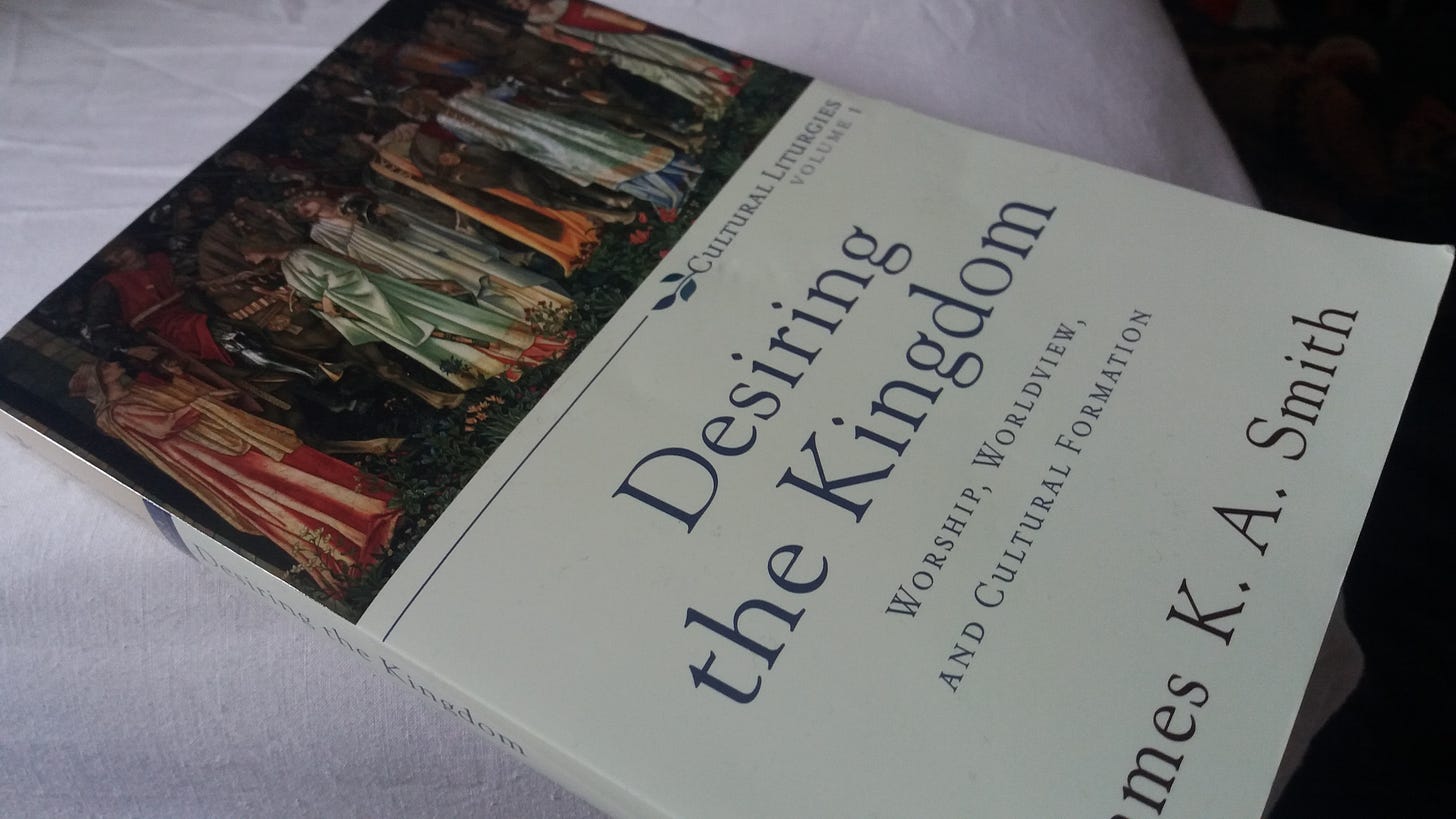Desiring the Kingdom
A former teaching colleague (and current friend) of mine is using Desiring the Kingdom as a key text for his Christian educational ministries degree. He asked if he could send me a few questions detailing my experience with James K.A. Smith's book and its impact on our school. Here's what I wrote back:
Can you briefly explain the format that you went about discussing Desiring the Kingdom together?
We used Desiring the Kingdom as a framework to work through discussions on classical education in theory and practice, as well as across schools (i.e. Grammar and Upper). Through this lens, we processed together thoughts and perspectives from the ACCS conference in Dallas, updated and continued work on our Curriculum Mapping initiative, interacted over and continued working out our trans-denominational perspective, reviewed and renewed our commitment to each other through the relational covenant, implemented new and creative ways to blend our classical Christian model of education, engaged in planning first day habits and liturgies, learned about and practiced teaching to different learning styles, discussed important educational mechanics like workload evaluation, grading standards, lesson planning, and school systems, and helped prepare staff for their part of our WISE (Walking in Step Educationally) Parent Training Conferences in August.
After discussing DTK, what did you sense was the overall response of the faculty to what James K. A. Smith is proposing? What aspects of Smith’s argument were most popular with the faculty? What were the critiques and did you have any significant pushback?
Smith’s perspective on ritual and liturgy were huge for our staff, particularly for those who had not considered either as being more everyday than every week (i.e. Sunday at church). This emphasis and language was important for our school as it gave the teachers both rationale and words for why we try to do what we do, whether it be Grammar school students walking in lines or Upper school students sitting meditatively in RISE (our morning assembly).
The most significant pushback had more to do with staff (particularly in the Grammar school) feeling it was a tough read. Some of these same staff felt Smith negatively overreacted to the ideas of capitalism, patriotism, and our nation’s Christian heritage.
Smith’s writing is pretty philosophical, heady. How did you go about putting hands and feet on his proposals?
One key to this was the assembly of a study guide by our theology/philosophy teacher. Another was allotting plenty of time during orientation (and in more informal conversations) during which the book and its contents were the main topic of discussion. We spent a good amount of time in the book’s introduction (which is really sufficient in many ways as a summary of the book).
What parts of the book did you think spoke directly to the VCA community?
Again, the ritual and liturgy emphasis was important, as was the Smith’s succinct statement that true Christian education should be about shaping what students love more than what they know. Historically, this has been the desire of the board for the school, but I wouldn’t say the language for this was as clear in the minds and hearts of the staff as Smith’s brief statement; however, once unleashed, there seemed to be quite an “a-ha” moment across all grades as to what we were after (and what we weren’t).
Which parts were particularly meaningful or important for you as the Head of School?
For me, Smith’s book was a powerful validation of much of what I have always believed about Christian education (classical or otherwise), summarized with great depth. The fact that our theology/philosophy teacher recommended the book to me with the words, “I think you’ll like this because it’s what I hear you saying” meant a lot and unintentionally loaned me some borrowed credibility in the eyes of the staff. As a second-year Head of School, this has been immeasurably helpful in at least giving me confidence that, while I’m continuing to solidify my educational philosophies and perspective, I’m perhaps not just making this stuff up out of thin air.
In this first quarter of the school year, where have you seen evidence of your discussion bearing fruit in the lives/work of your faculty, parents, and students?
As we have a good amount of new staff (some brand new to teaching), I feel our time in Desiring the Kingdom has been particularly helpful in getting them off on the right foot. While the majority of our teachers (new or veteran) wrestle on a weekly basis with what classical Christian education looks like in their classes, I think we’re newly aware of what it doesn’t look like as a result of our reading the book.
This brings clarity to our efforts and bolsters confidence in our attempts to train parents and students in a more character-focused, virtues-driven education as opposed to one more competency-focused and values-driven. Reading the book through the summer, training through its presuppositions during staff orientation, and then implementing and applying these ideas face-to-face by utilizing our teachers as the main presenters at our two-day parent orientations got all of us off to as good a start as I would have hoped. Still, there’s plenty of opportunity to revisit and review Desiring the Kingdom, as old educational habits for all involved tend to die hard.




